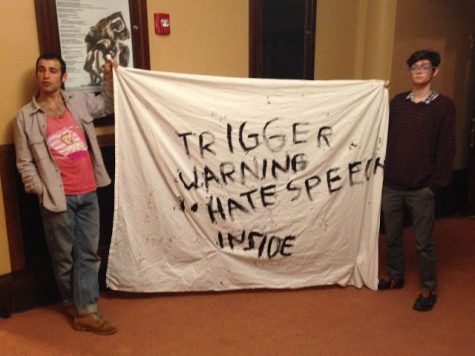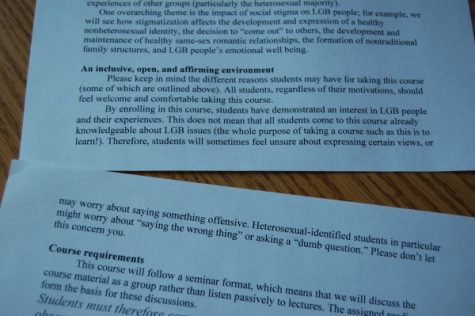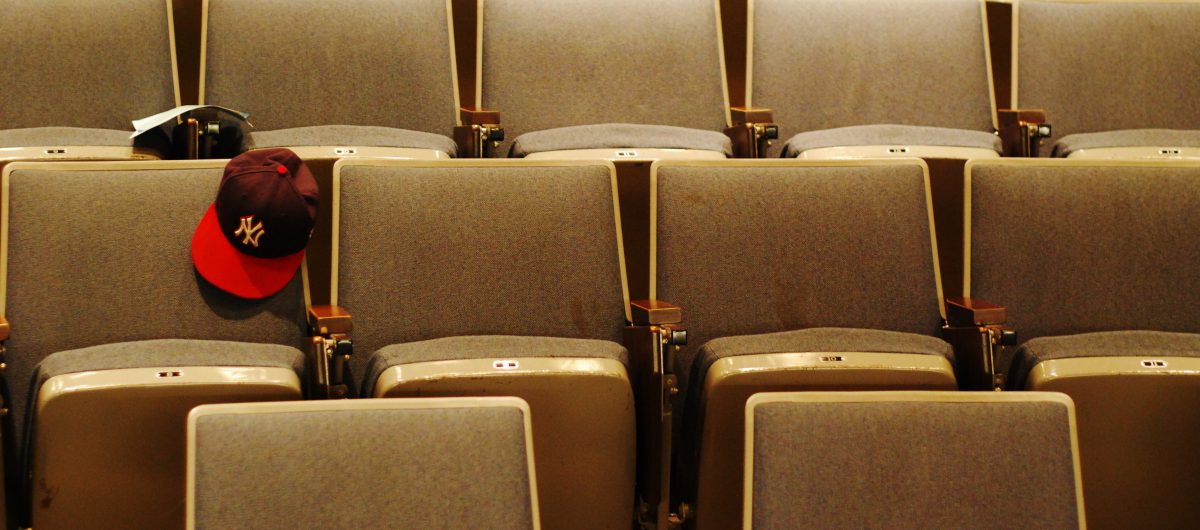Trigger warnings and safe spaces on college campuses spark emotional discourse
November 4, 2016
Imagine you’re a student who has experienced a past trauma — perhaps you’re healing from a sexual assault or still struggle with PTSD from military combat — and you sit down in today’s lecture which, unbeknownst to you, contains a vivid depiction of that trauma. For some, the departure from class is embarrassing, stressful, or maybe even impossible when suffering from an anxiety attack.
For the victims of traumas such as these, do we not owe a trigger warning or a safe space? Or are these resources a crutch for deeper issues that will only worsen post-graduation?
This topic has been widely debated across the country this year – especially on college campuses. In August, University of Chicago Dean of Students John Ellison made headlines with his Class of 2020 welcome letter, stating that the university, “does not condone the creation of intellectual ‘safe spaces’ where individuals can retreat from ideas and perspectives at odds with their own.” The letter stresses the university’s commitment to freedom of expression and opposition to censorship.
In response, more than 150 faculty members at UChicago published an open letter in The Chicago Maroon, neither denouncing nor encouraging trigger warnings and safe spaces. The letter stated, “the right to speak up and to make demands is at the very heart of academic freedom and freedom of expression generally. We deplore any atmosphere of harassment and threat. For just that reason, we encourage the Class of 2020 to speak up loudly and fearlessly.”
The future of policies on trigger warnings and safe spaces is unclear on most campuses. and the climate at UMass is no exception. Although groups like the Coalition to End Rape Culture (CERC), the Center for Women and Community, and Residential Life support these resources, policies are not in place campus-wide due to the polarizing debate.

Some say trigger warnings, forewarnings of sensitive material and safe spaces — places where students can feel safe in expressing their feelings without judgment — coddle students who need to learn the uncensored horrors of the real world. Trigger warning supporters argue that these resources are necessary for college students who are healing from traumas. Kieran Talkiewicz, a 21-year-old senior studying neuroscience, argues the college classroom is a unique environment in that it is a mandatory commitment that students cannot easily leave.
When speaking of triggering events coming up in college classrooms, Talkiewicz states,
“That won’t be something you come across every day [in the real world]. You can usually leave these spaces more times than not or divert a conversation. But to sit a lecture hall with 300 people … It’s embarrassing to have to leave,” Talkiewicz said.
Talkiewicz is also the Treasurer of the CERC, an initiative at UMass, part of whose mission is to educate the campus community and change social norms around the issue of sexual assault and the stigma around it. Through his own personal experience and experiences with other individuals in CERC, Talkiewicz says that without trigger warnings, some students do suffer anxiety attacks or need to talk to a therapist after a triggering event.
“A simple email the night before a lecture, saying, ‘Hey, we’re going to be talking about this tomorrow. It could be upsetting to some people. Be prepared.’ A simple email like that is needed and I feel that’s not asking too much of a professor,” Talkiewicz said.
While Talkiewicz says that trigger warnings are not just coddling students, UMass Journalism Professor, Shaheen Pasha, states the contrary. In 2015, Pasha wrote an article entitled, “Trigger Warning: This Article May Piss You Off” about her view on the fallacy of safe spaces on college campuses. She explained her position by citing her own college experience.
“College is not a safe space. It was never intended to be. It is a place where debates can turn heated and ugly and the cruel realities of the world come crashing down on students, preparing them for the very real discourse they will face upon graduation. It is a time to grow out of the protective cocoon of childhood and face the fact that the world can be an unpleasant place,” Pasha wrote.

Today, Pasha still holds the same opinion.
“It’s problematic in that it hinders learning for other students,” Pasha said.
Pasha references a Harvard psychologist’s opinion piece that explains that trigger warnings in classrooms do a disservice to students with past trauma. The trigger warnings fail to encourage students to seek help, enabling the ongoing trauma.
“I’m not a psychologist, but that makes sense to me. I’d rather help my student get long-term help,” Pasha said.
As a journalism professor, Pasha believes the need to have a trigger warning or a campus-wide safe space is unrealistic.
“My problem is when there are blanket bans on free speech on campus, even if it’s something distasteful. We need to hear opposing viewpoints. We don’t have to like them but we need to be aware of them to be informed citizens. But I support like-minded individuals getting together in a place they feel safe talking to each other,” Pasha said.
However, it is statements such as these that anger UMass senior political science and psychology double major Abigail Alfaro, 21.
“Trigger warnings aren’t about the curtailing of free speech, but the legitimizing of PTSD and mental illness. They’re about approaching difference with compassion and empathy. They’re about allowing people the opportunity to do what they need to do to take care of themselves,” Alfaro said.
Ultimately, the debate on the legitimacy and moral implications is not one with an easy solution. Especially for survivors of sexual assault, the resolution of the debate will determine if they students feel supported on their campus with coping resources.
For CERC, a policy change for trigger warnings and safe spaces is not at the top of the agenda. And for professors like Shaheen Pasha, backing down seems like a surrender.
“I can’t tell other professors how to run their classes. I run a journalism class and for journalists, life will be a trigger. In my view, and having spoken to other professors in different fields, it can be a slippery slope,” Pasha said.
Email Sarah at saspencer@umass.edu or follow her on Twitter @SarahASpencer.
